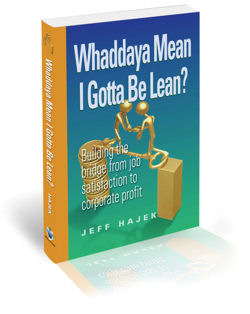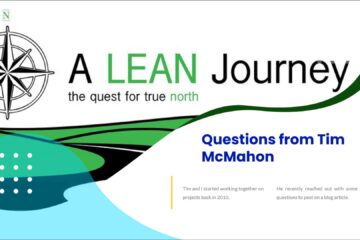What I Learned from Almost Winning the Shingo Prize
At beginning of this year I decided to apply for the Shingo prize for my book Whaddaya Mean I Gotta Be Lean? Technically, the award is called “The Shingo Research and Professional Publication Award”, but most people just refer to the award as The Shingo Prize.
Unfortunately, the steering committee decision came right down to the wire and ultimately my book came up just short of winning. At first I felt rather bad about it and did not plan on sharing with my readers that I had even applied. But as I contemplated it more, a few things came to mind.
In the end, I decided my thoughts would make a good article. So, here’s what I came up with…
1. Not winning is not the same as losing.
Being told ‘No’ is always hard, but stepping back from the initial disappointment, I was able to put things in perspective. The fact is, only a handful of books win the award out of all that volumes that are published on Lean topics each year. And getting so close means that Whaddaya Mean I Gotta Be Lean? is among the top few percent all Lean books. My book, to make it to the end like it did, was viewed rather highly. In fact, the steering committee for the award wanted to get copies of the book after the reviewers made their recommendation, which, as I understood it, was not typical. It just reinforces how close the decision was. Plus, the book has a 5 star rating on Amazon, and I’ve got a lot of positive feedback from other reviewers.
The lesson I take away is that shooting for a high goal and falling short can still yield pretty good results. Being second in a crowded market, for example, is far better than being 12th. The key is just to use the experience of falling short to get closer the next time.
2. Don’t get discouraged.
I was rather down when I got the standard ‘Sorry, but…’ email about my book. But I am choosing to take this as a challenge to get better.
Avoid letting a setbacks discourage you. Life is full of obstacles. Navigating around them is one of the keys to success. That’s not to say you should be foolish about where you are competing and what you are attempting, but most routes to glory take a lot of persistence.
3. You probably know more than you think.
When I wrote Whaddaya Mean?, I had just left the corporate world, and was writing as a side gig while I was staying home with my children for a while. I hadn’t intended it to be much more than a way to keep my mind sharp, but as I started getting feedback, it seemed like I was onto something with my message. So, the book launched my business and led to a lot more writing, notably The Continuous Improvement Companion. And as it turns out, it is possible that nearly half a million people around the world will visit my site or watch my videos on YouTube this year to learn more about what I know. A few years ago, I never would have imagined that my experiences could help that many people.
In my situation, I didn’t need a nudge to take the risk of writing a book. And now, I would run a pretty measly website if I was reluctant to document my ideas. But many people have vast stores of wisdom in their brains that they never share. Even if it is just jotting down some notes in a journal, or adding some information to a process manual, get the information out of your brain on onto some format where it can help others. And leaders…take it upon yourselves to give people that nudge that most people need to tap into their gray matter and share their wisdom.
4. Get a team of mentors to help you.
One of my biggest takeaways is that the right team makes a huge difference. When I look at the previous winners of the Shingo Research and Professional Publication award, I notice a recurring thread. The books are all published by big companies, and most are organizations with a specialty in Lean oriented books. LEI and the Lean Enterprise Academy in the UK, Productivity Press, and CRC Press all have winners, and they all have a lot of great, experienced people who can help authors make their books even better. As a fledgling author with no real writing experience, it would have been hard to pitch my book and get picked up by a publisher. But being self-published, I undoubtedly made many mistakes that more experienced professionals could have helped me avoid. While I am proud of the fact that I managed to get so close on my own, I would have much rather won the award with some assistance.
Fortunately, in the business world, there are not the same types of gates to navigate to build a team. Your company probably don’t need to get ‘picked up’ by a marketing expert, or graphics designer, or Lean consultant. Find experts to help you out. Not only do they pay off in the results they deliver, but they can also help you prevent costly mistakes. And with the rise of social networking, there is greater access than ever to massive brainpower.
5. Take a risk.
I actually have two risks that I took. The first was just in writing the book. While there is a common belief that writing a book is cheap, it is anything but. 95% of books don’t break even, and that doesn’t even count the time spent writing. (Note: That stat is from memory, and I can’t recall where I heard it from…) You have to pay editors, and graphics artists, and the typesetters, and the indexer, and drop a load of cash for promotional costs, and pay for printing of proofs, and you have to send out countless review copies, and…Well, you get the point. There is a lot of expense, so not only do you really have to believe in the message you want to spread, but you also need to have faith that you will be able to sell the book.
The second risk is in talking about not winning. I don’t like broadcasting anything but great news to my audience. As a blogger and trainer, I am perceived as an expert. I am also a bit humble, so when I am in person, I tend to shrug off compliments about my expertise. But the nature of the competitive business of Lean training and consulting is such that any negative impression a potential client has is easily remedied by clicking to a website with more stratospheric claims. So while I tend to refrain from touting the 8,300% productivity gains, and 99.457% success rates other sites might claim, I also don’t like airing my dirty laundry. In this case, though, I think the value in talking about my award process experience outweighs the negative.
But the fact is that without risks, there are seldom substantial rewards. Without writing my book and getting positive feedback, I would have been unlikely to take the next step into launching my business. And we’ll see whether talking about nearly winning the award pays off…
6. Learn from your experiences.
I will undoubtedly write another book in the future, and will use the lessons I learned from this endeavor to make the next one even more successful. Making a mistake is forgivable. Not learning from it is less so.
Let that be your takeaway, especially if you are a leader. Help your team reflect on what they did wrong instead of chastising them. Getting angry won’t change the past, but how you deal with the shortcoming will have a major impact on the future.
7. Practice, practice, practice.
When I wrote my book, I had no experience. I had not yet developed my writing style, and I had not been able to see reader feedback to know what resonates with my audience. Now that I am constantly writing, my style is continuously developing and improving.
You don’t get better at something unless you practice at it. Whether it is writing, or problem solving on a shop floor, or making process improvements, you only get better at the skills you use regularly. And the ones that are closeted away start to atrophy.
You will use some of your skills naturally as part of your job. If you are a computer programmer, you won’t likely forget the code you use on a daily basis. But if you are an office manager who updates an inter-office website every few months, you will likely need to refresh your memory before doing the task. Think about what skills are important to you, and make a plan to use them at least every few weeks so you can keep them from fading.
8. Appreciate the people you meet on the path.
As I look back at the path that led to me to the point where I am now writing this article, many people come to mind. Some had a minor impact, but others helped me more substantially, either directly, or through the way they helped shape my professional persona.
Likewise, there are some people along your journey that will stand out. Someone probably gave you advice that helped you land a job, or someone watched your back and prevented you from making a costly mistake. In many cases, the people who helped you out won’t even realize the impact they had, so make sure you tell them. (Note: I actually wrote quite a few individual “thank you” comments, but it got rather long. Instead, I’ll make sure I reach out to them individually so you don’t have to wade through a lot of personal sentiments…)
9. Understand the benefit of external affirmation.
In this case, part of the reason I wanted to win the award is that it would undoubtedly have helped book sales, and by extension, improved my training and consulting business. This particular ‘attaboy’ carries a lot of weight, so it would have been a big boost to my company.
But not all pats on the back are created equal. Sometimes, the cost of getting one is far higher than the benefit. Before going for a certification, whether personal or for your company, ask what it will bring you and your customers. If you can’t answer clearly what it is that the accolades will deliver, then consider if your effort would be better spent just figuring out how to serve your customers better.
10. Get the facts.
Right now, I am still waiting for feedback from the examiners and steering committee. I’ll be interested in seeing if the things I recognize as shortcomings were the same as what they saw.
The point though, is that when you are in the ‘C’ step of the PDCA cycle, make sure that you have the real facts. If I were to start on my next book (any ideas?) right now, I would not have all the information I need. Gather facts before changing direction on a project. You are often better off stopping briefly rather than adjusting course blindly.
The short of it is that I am disappointed about not winning, but I am choosing to use the lessons I learned to make my future projects even better.
By the way, the book is great, even if it was not perceived by the steering committee to be one of the top 10 of the year. I highly recommend picking up a copy of it…




1 Comment
Audrey Florakis · June 16, 2011 at 8:26 am
Hi Jeff,
Thank you for your inspirational article. I am very particular about the articles I choose to read as I only have so much time in the day.I am so glad to have read yours today.
I also have found it dificult to embrace and share personal failures so I commend you on sharing your very personal lessons learned. Your words gave me a chance to reflect on my Lean journey and refocus my efforts at work and at home.
Thank you,
Audrey Florakis